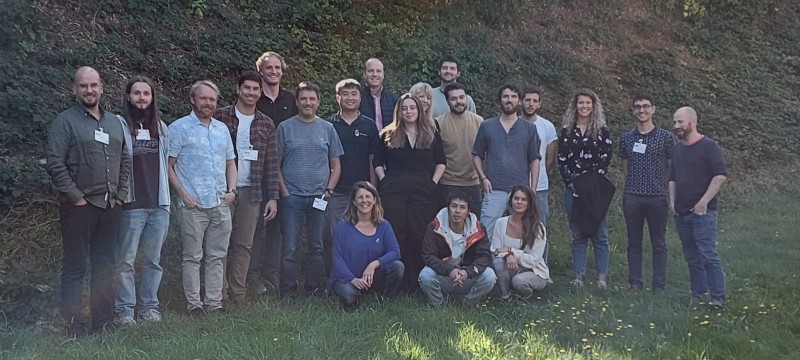TRACESAMORS (TRACE metal SAMplers and sensORS) Workshop
Léo Mahieu
University of Liverpool

Caption: Group picture of the on-site participants (Leo Mahieu is fifth from right).
The distribution of trace metals in seawater is essential knowledge to explain and predict phytoplankton growth. Indeed, trace metals are essential for phytoplankton development and carbon fixation but can also reach toxic levels notably in coastal areas. Toxic levels can trigger the production of organic compounds toxic to human health. To be well constrained, the cycling of trace metals needs to be resolved in the time scale of hours to weeks in key locations to cover the fluctuation induced by short residence times and highly variable inputs in space and time. The use of traditional on-site sampling procedures with in-lab analysis is not ideal to reach such a resolution because of the manpower and time required.
The TRACESAMORS workshop aimed to bring together scientists specialised in trace metals to discuss key questions related to remote samplers and sensors. Over the 3 days of the workshop, participants have been interacting in different discussion groups. The first group was about inventorying the emerging technologies and probes that are being developed, and to discuss the way the new and past tools can be combined to create tomorrow’s technologies. The second one aimed to constrain the best approach related to intercomparison and calibration of the technologies used individually to extend the impact and value of the data collected. The third group discussed the key areas of where to focus sensor deployment to maximise the interest of the community on the data collected. In the fourth and final group, the technical limitations and potential ways of improvements related to the incorporation of trace metal sensors on infrastructures such as moorings and autonomous vehicles were discussed.
This workshop was a great opportunity for the participants to come together to share their work in the field of trace metal remote sensors and samplers. In this friendly environment, participants could confront their problems to others' knowledge, and discuss ways to resolve these limitations through a collaborative perspective. The need for more collaboration in the field was a clear output of the workshop, therefore, as the first workshop aiming to tackle the questions mentioned above as a community, the need to advertise the existence of this emerging community appears to be an essential step forward for the community. It has been decided to prepare a state-of-the-art review on emerging technologies and existing limitations on trace metal samplers and sensors. The review will include a validation procedure for the sensors and advertise the possibility of an intercomparison effort to take place within the next 5 years. The TRACESAMORS community hopes that, for the next meeting in 2 years, the community will have reached out to more people interested in bringing their work and knowledge. In a longer time scale, TRACESAMORS validation could become a strong international community providing intercompared data related to the cycling of trace metal from remote sensors and samplers.
It was very valuable for me to join the TRACESAMORS workshop as an opportunity to learn more about remote trace metal sampling and sensors from specialists and to meet students developing what could be tomorrow’s best technology. I am very much looking forward to being part of the reviewing process and to join the next meeting of this emerging community.
Profile:
I am a PhD student at the University of Liverpool in the School of Environmental Sciences. My research is focusing on trace metal cycling, mostly Iron. My PhD is focusing on the role of dissolved organic matter on Iron distribution. I am investigating this question using voltammetric techniques, for which I have also been developing apparatus and techniques. My objective is to make voltammetric techniques a more reliable source of information by developing easy procedures and cheaper set-ups, and to integrate voltammetric techniques in wider studies comparing complementary results such as specific compounds analysis and fluorescence.
Latest News
Royal Society Publishing Photography Competition 2025
Please see a message from the Royal Society below:
We are delighted to announce that the 2025 Competition is now open for entries until 15 August for a chance to win £1000! The competition celebrates the power of photography in conveying the wonder of science happening all around us and photographs can be submitted in the categories of: Astronomy, Behaviour, Earth Science and Climatology, Ecology and Environmental Science, and Microimaging.
The competition is free to enter and open to anyone studying or working in science at graduate level or above. Category winners will receive a one-year membership to the Royal Photographic Society and the overall winner will receive a grand prize of £1,000. Find out more: https://bit.ly/RSPphotocomp
October 2025 MEDIN Workshop: Marine Data Management, Governance and the MEDIN toolset
The Marine Environmental Data and Information Network (MEDIN) are pleased to announce that registration is now open for the next occurrence of our popular free online training workshop: ‘Marine Data Management, Governance and the MEDIN toolset’ on the 13th – 17th October 2025 on OceanTeacher Global Academy.
Marine Data Management, Governance and the MEDIN toolset
The Marine Environmental Data and Information Network (MEDIN) and OceanWise are delighted to invite you to attend our popular free online training workshop: ‘Marine Data Management, Governance and the MEDIN toolset’ on the 19th – 23rd of May 2025.
